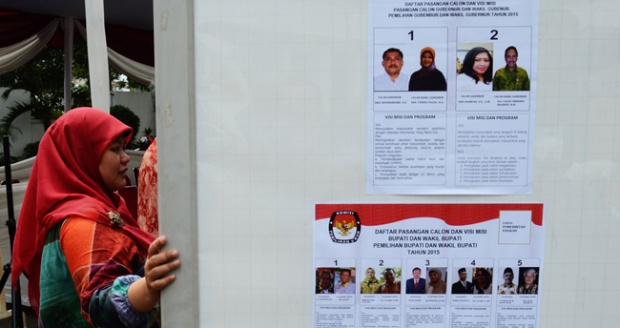
TEMPO.CO, Jakarta - It is difficult not to be suspicious when several regional chiefs resign at the same time as their families prepare to run in elections to replace them. For example, the tenures of Pekalongan Mayor Basyir Ahmad and Ogan Ilir Regent Marwadi Yahya are not scheduled to end until August this year, but both men have insisted on 'taking early retirement' to pave the way for their wives and children to step forward as their replacements.
In Sibolga, North Sumatra, Deputy Mayor Marudut Situmorang revealed there had been attempts to stop his wife from running as mayor. The local legislative council (DPRD) has yet to announce Marudut's resignation despite the looming deadline for his wife's nomination as mayoral candidate at the end of June. In East Kutai, Regent Irsan Noor resigned long before the ruckus of nominations for the new executive began. His wife, Nurbaiti Noor, currently a DPRD member, plans to run for the seat vacated by her husband. They have served for an average of two terms.
The opportunity to remain in power appeared after the General Elections Commission (KPU) issued Circular No. 302/2015 on June 12. Article 7 of the Regional Heads Election law clarifies that there must be no conflicts of interest or blood ties (including through marriage) between incumbents and nominees, unless there is a gap of one term of office. This circular seems to have motivated people to obtain 'non-incumbent' status to meet one of the three requirements: term of office to end before nominations open, resignation before nominations or permanently inability to continue in office before nominations.
The establishment of political dynasties is prevented by the requirement for a one-term gap. But there is a legal loophole that needs to be closed, for example, by stipulating that a regional chief or deputy chief must resign one year before nominations open. The requirements for resigning could then be made stricter. The Regional Government Law states that a regional chief leaves office in the event of death, resignation or dismissal.
Unfortunately, the grounds for 'resignation' are not clearly stated. For example, it is not clear whether or not the resignation of a regional chief should depend on the DPRD as the representative of the people in the area concerned, or if it should simply be in the form of an announcement as happened in Pekalongan and Ogan Ilir. In Sibolga, Marudut's request to resign is on hold because some DPRD members believe the deputy mayor has breached the code of ethics and not upheld his oath of office.
According to the Home Affairs Ministry, 57 regional chiefs have established political dynasties. The ministry needs to be more serious in its efforts to prevent this. How? Among other measures, by extending the time between resignations and the opening of nominations to one year. In this way, people would not be able to exploit the loophole in the law.
Our Constitution guarantees every citizen the same political rights without considering their origins or dynastic background. But the nepotism established in political dynasties has the potential to divert economic resources into individuals' pockets instead of being used to bring about wider prosperity. Corruption flourishes and the result is that regional revenues disappear.
There are far more disadvantages than advantages to political dynasties. Now is the time to clear these dynastic trees all the way down to their roots. (*)























